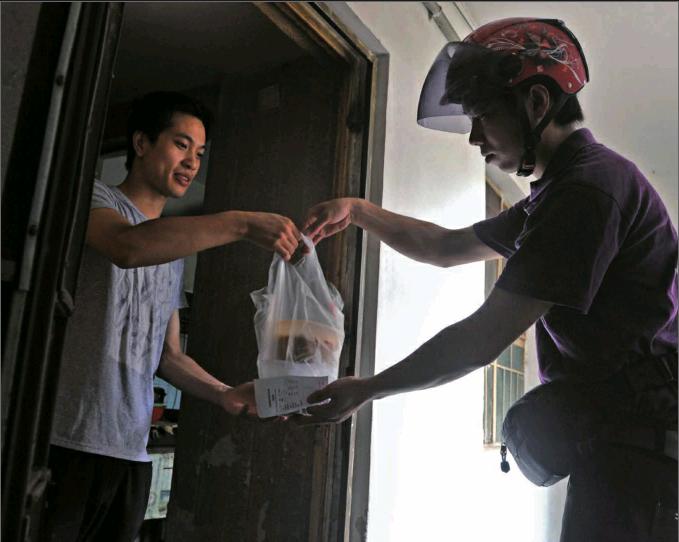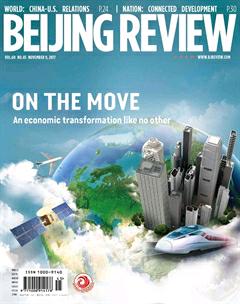A Taste of Progress
By+Wen+Qing


Hou Yanan, a 26-year-old employee at a big public relations firm in Beijing, is one of the citys surging number of online food delivery users.
“Like many of my colleagues, I order almost every lunch on food delivery platforms from Monday to Friday, and sometimes even purchase my dinner online when I work overtime,” Hou told Beijing Review.
The online takeaway industry is burgeoning in China along with the rapid development of the Internet economy. Many people are happy to enjoy the convenience brought by this fresh service.
But environmental activists complain that the huge volume of plastic utensils, wrapping and cartons poses a great challenge to the environment, and the heavy use of disposable wooden chopsticks is depleting natural resources.
On September 1, the Beijing No.4 Intermediate Peoples Court accepted a lawsuit fi led by the Chongqing Green Volunteer League, an environmental non-government organization (NGO), against the countrys three largest food delivery platforms—Baidu Waimai, Ele.me and Meituan.
The NGO alleged that the companies failed to provide customers with the choice to not receive disposable plastic utensils along with their food deliveries. Meanwhile, throwaway utensils provided by the three platforms have created large amounts of rubbish and caused serious ecological damage.
Rising concern
It is not the first time that people have focused on the explosive growth of plastic waste accompanying the surge in online food ordering. Recently, a story titled“Takeout Delivery Is Destroying Future Generations” went viral on WeChat, the most-used social media app in China. It also highlighted the eco-threat posed by plastic products made for takeout food.
Easy access to the Internet and effi cient delivery are attracting an increasing number of people to use online food delivery service. Three out of every 10 people are consuming the service in China, ordering about 20 million takeouts every day, reported Xinhua News Agency. In addition to bringing convenience for customers, the burgeoning food delivery sector has created millions of jobs.
On workdays, many people like Hou order meals online, especially during scorching hot or bitter cold weather, to avoid having to visit crowded restaurants and to save time.
“I am too busy to cook, and I think most of my colleagues have the same problem. During lunch time, you can see many deliverymen in red, blue or yellow jackets, as they work for different delivery platforms, fl ocking to our building and waiting for customers to take their food,” Hou said.endprint
A simple dish of noodles, for example, requires at least a bowl, a lid, spoons, disposable chopsticks and some plastics bags. If the consumer also orders chili, vinegar or soy as fl avoring, then yet more plastic is used to package these condiments. Thus, it is not hard to imagine how mountains of plastic waste pile up across the country every day.
Is it possible to replace plastic utensils with paper containers, which are more environmentally friendly? This sounds good but is diffi cult in reality due to the diversity of the Chinese diet. Foods such as porridge, hot pot and noodles in soup would soak paper containers before they reach consumers.
According to media statistics, from January to May this year, 30.47 million tons of plastic products were produced in China, an increase of 3.8 percent year on year which closely correlates with the surge in takeout deliveries.
Who to blame
In the opinion of the Chongqing Green Volunteer League, food delivery platforms such as Baidu Waimai, Ele.me and Meituan are the first to receive blame for the proliferation of plastic waste because they deprive consumers of the right to choose whether or not they want disposable plastic utensils.
In response, both Meituan and Ele.me, which acquired Baidu Waimai in August, have pledged to take measures to reduce plastic waste.
On August 31, Meituan announced that it would appoint a chief environment officer to oversee environmental issues from plastic waste and upgrade its smartphone app to provide consumers with the option of ordering food without disposable chopsticks, spoons or napkins.
Ele.me followed on September 6 by offering a similar choice and putting forward a plan to introduce suppliers of degradable plastic utensils to restaurants in the long term.
In addition, consumers and restaurants also play a role in generating the plastic pollution. According to Zhou Yi, a senior public relations officer at Ele.me, few consumers opt to not demand disposable plastic utensils when ordering meals online, as many people much more prefer the convenience of throwaway plastic utensils, which can be discarded immediately after the meal without needing to be washed.
Also, restaurants focus most of their attention on satisfying consumers with flavorsome dishes and ignore their obligation to protect the environment. For example, many restaurants include disposable plastic utensils with food orders even when consumers do not want them, as they find it troublesome to distinguish such orders from those that require utensils. Negative reactions from consumers such as those who fi nd there are no chopsticks to eat their takeout food would badly affect a restaurants business.endprint
Besides, to keep food warm and prevent soup from spilling, restaurants sometimes wrap plastic bowls with many layers of clingfi lm, which also adds to the heavy burden on the environment.
Worse still, restaurants mostly use nondegradable plastic products due to their low cost, which pose an environmental hazard for decades or even hundreds of years.
Possible way out
Concerted efforts by delivery platforms, consumers, restaurants and government departments are required to address plastic waste pollution, Hou suggested.
For platforms, promoting environmental protection and instilling this idea in consumers are a meaningful move. Moreover, in the future, they should also make strict rules on the use of plastic utensils. For example, no more than one plastic bag should be used to wrap soup dishes, and all plastic products should be degradable. It is a long and arduous task for them, and the recent reactions from Ele.me and Meituan are just beginnings.
Considering most takeout food packaging is dumped in garbage bins and then disposed along with other household trash, sorting of waste also becomes more important. Government departments could play a major role in this, and by recycling some materials, waste pollution could be reduced and resources saved.
Furthermore, there have been growing calls that the government should also invest more in developing degradable plastic products or environmentally friendly alternatives.
Though consumers enjoy the convenience yet also suffer exposure to the pollution, many of them have paid little attention to the plastic waste problem. For example, when talking about the possible measures to deal with plastic waste, Hou said, “As a matter of fact, I barely think about this issue and I believe the government should shoulder the main responsibility.”
Therefore, environmental groups have called for more efforts to raise the public awareness of environmental protection. They also suggest that consumers change their habits a little by using their own utensils and dishes and refusing unnecessary plastic containers.endprint

